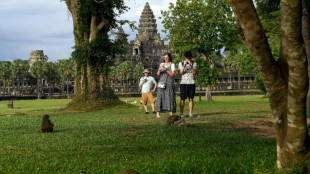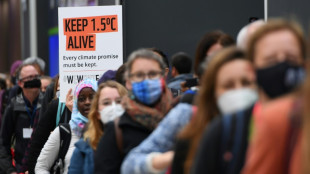
-
 MotoGP champion Martin taken to hospital after Malaysia crash
MotoGP champion Martin taken to hospital after Malaysia crash
-
YouTubers causing monkeys to attack tourists at Cambodia's Angkor Wat

-
 Sweden reels from worst mass shooting in its history
Sweden reels from worst mass shooting in its history
-
India's Modi takes ritual dip at Hindu mega-festival

-
 Nissan shares fall as reports say Honda merger talks off
Nissan shares fall as reports say Honda merger talks off
-
US Postal Service says suspending parcels from China

-
 Toyota announces Lexus EV plant in Shanghai
Toyota announces Lexus EV plant in Shanghai
-
Santander reports record profit for third straight year

-
 No new clothes: S. Korean climate activist targets hyperconsumption
No new clothes: S. Korean climate activist targets hyperconsumption
-
Cummins 'hugely unlikely' for Australia's Champions Trophy bid

-
 Nissan shares plunge as report says Honda merger talks off
Nissan shares plunge as report says Honda merger talks off
-
China holds out hope last-minute deal can avert US trade war

-
 LeBron relishing 'special' Doncic double act
LeBron relishing 'special' Doncic double act
-
Tatum shines as Celtics down Cavs, Lakers thrash Clippers

-
 Myanmar junta bid to sell Suu Kyi mansion flops for third time
Myanmar junta bid to sell Suu Kyi mansion flops for third time
-
Australia bans DeepSeek AI program on government devices

-
 Olympics on horizon as China hosts Asian Winter Games
Olympics on horizon as China hosts Asian Winter Games
-
Tatum, White shine as Celtics down Cavs

-
 Google pledge against using AI for weapons vanishes
Google pledge against using AI for weapons vanishes
-
African football has the platform for historic World Cup success

-
 France prop Gros happy to go 'under radar' for Dupont's benefit
France prop Gros happy to go 'under radar' for Dupont's benefit
-
Bove's future uncertain after heart attack horror as Fiorentina finish Inter clash

-
 Race against time to complete contested Milan-Cortina bobsleigh track
Race against time to complete contested Milan-Cortina bobsleigh track
-
Speed queen Goggia pursuing Olympic dreams with 2026 Winter Games on horizon

-
 Asian markets stutter as traders weigh China-US trade flare-up
Asian markets stutter as traders weigh China-US trade flare-up
-
French PM set to survive no confidence vote

-
 Trump says US will take over Gaza, create 'Riviera of the Middle East'
Trump says US will take over Gaza, create 'Riviera of the Middle East'
-
Google shares slide on spending plans despite sales jump

-
 Honda shares jump on reports it wants Nissan as subsidiary
Honda shares jump on reports it wants Nissan as subsidiary
-
Trump says US will 'take over' Gaza as he welcomes Netanyahu

-
 Netflix drops 'Emilia Perez' star Oscar bid over offensive posts: reports
Netflix drops 'Emilia Perez' star Oscar bid over offensive posts: reports
-
Sirianni embraces emotions ahead of Chiefs rematch

-
 Top climate scientist declares 2C climate goal 'dead'
Top climate scientist declares 2C climate goal 'dead'
-
US Treasury says Musk team has 'read-only' access to payments data

-
 Leaders 'should respect' wishes of Palestinians to stay in Gaza: Palestinian UN envoy
Leaders 'should respect' wishes of Palestinians to stay in Gaza: Palestinian UN envoy
-
Paris Saint-Germain, Brest, Dunkerque advance to French Cup last eight

-
 Simeone brace helps Atletico thrash Getafe, reach Copa del Rey semis
Simeone brace helps Atletico thrash Getafe, reach Copa del Rey semis
-
Trump hosts Netanyahu for pivotal Gaza ceasefire talks

-
 Atletico thrash Getafe to reach Copa del Rey semis
Atletico thrash Getafe to reach Copa del Rey semis
-
Stocks recover but tariff uncertainty lingers over market

-
 Shiffrin to sit out world team combined, dashing Vonn hopes
Shiffrin to sit out world team combined, dashing Vonn hopes
-
Mahomes avoids 'G.O.A.T' talk as history beckons

-
 Undav sends Stuttgart into German Cup final four
Undav sends Stuttgart into German Cup final four
-
Alcaraz battles through in first match since Australian Open

-
 Trump backs jailing Americans in El Salvador if has 'legal right'
Trump backs jailing Americans in El Salvador if has 'legal right'
-
What Elon Musk's Twitter tactics may bode for US government

-
 Trump signs order withdrawing US from UN bodies
Trump signs order withdrawing US from UN bodies
-
'Bodies on the ground': mass shooting shocks Sweden's Orebro

-
 Rubio brushes aside aid uproar
Rubio brushes aside aid uproar
-
Rubio accuses Cuba, Nicaragua, Venezuela over migration crisis


There will be accountability for Ukraine crimes, eventually: expert
Shocking images of bodies strewn in Ukrainian streets clearly indicate war crimes, but legally proving that and ensuring accountability is tricky, according to a top international justice expert.
The calls for war crimes investigations and trials over Moscow's conflict in Ukraine have intensified after horrific photographs emerged of corpses in roads and in mass graves in Bucha, near Kyiv, after Russian troops retreated from the devastated town.
The Kremlin has denied responsibility and suggested the images are fake or that the deaths occurred after Russian forces pulled out of the area.
Philip Grant, who heads the TRIAL International NGO that works to ensure accountability for international crimes, said that, while powerful, such images alone cannot legally prove war crimes have occurred and who is responsible.
"Images in themselves rarely count as the defining evidence," he told AFP in an interview.
"They can reveal important elements, but they will not reveal the full story," he said.
Grant said it was important to be "cautious" when interpreting events, pointing to past examples of manipulation and misinterpretation.
There was, for instance, the dramatic misreporting that a massacre occurred during the 1989 Timisoara uprising in Romania, and Soviet efforts during the Nuremberg trials to pin its own 1940 Katyn massacre of Polish officers on Nazi Germany.
- 'Clear-cut' -
At the same time, Grant said, investigators should "exercise sound judgement" with what they can see.
In the case of the Bucha images, "it looks pretty clear-cut that war crimes have been committed," he said.
But the images alone do not make it possible to "attribute that responsibility to a specific person or to a specific group."
Even if it was determined that "Russians did it," he said, "that's not accountability. We need to know who ordered that."
"Is it (Russian President) Vladimir Putin? Is it the commander on the ground? Is it a rogue unit?"
"In terms of criminal liability," he said, "it's too early to say who should end up in court for those crimes."
That process can be long and complicated, he acknowledged.
As the International Criminal Court, the UN Human Rights Council and a growing number of countries begin sending war crimes investigators to Ukraine, they will have their work cut out for them, Grant said.
- Is it a crime? -
The first step is to "make sure you have a crime".
"It might look obvious, but it's not always," he said, pointing out that in war, unlike in civilian life, killing people can be lawful.
A soldier killed in battle is not considered a crime, but if that soldier is killed after being wounded or taken prisoner, it is.
And if you find a mass grave with soldiers killed in combat, "that is not a crime," Grant said.
But "if you find in the mass grave a family, civilians, that is probably a crime."
After determining a crime has been committed comes the even more complicated task of figuring out who is legally responsible.
With war crimes, you can have "many circles" of accountability, Grant said, from the perpetrator, to superiors who may have ordered the crime, or failed to exercise control over soldiers involved.
- Top-level liability -
"The levels go all the way up to the top," he said.
In cases where evidence points to top-level criminal liability, the main challenge is "getting access to the suspects," Grant said.
If the Ukraine investigations "point to criminal responsibility of Putin, you would need to put your hands on the person."
"That's not going to be something easy," he said, but "it is possible."
Importantly, there is no statute of limitation for war crimes.
Those involved could be held accountable even decades after the fact, as with former concentration camp guards and officials still being put on trial for crimes committed during World War II.
Grant said for Ukraine, even lower-level commanders and civilian authorities "could be liable for crimes committed for a long time to come."
"Putin is 69," he pointed out. "That leaves a little bit of room, but there are others."
"There are probably hundreds of people in the security apparatus who could at some point be held accountable, not even talking about the field soldiers."
M.Odermatt--BTB



